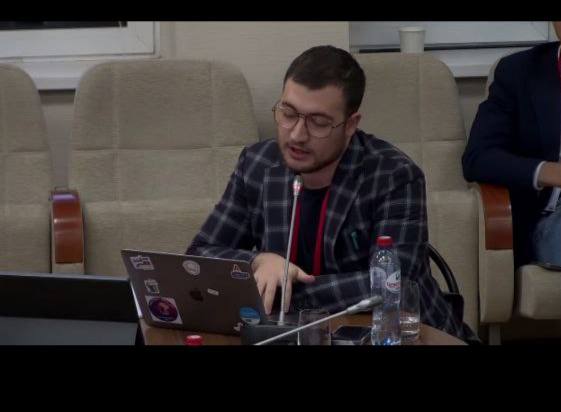2nd year student took part in the MGIMO conference "Russia and ASEAN in the Asia-Pacific Region: Dynamics of Interaction"
From 12 to 14 October, MGIMO hosted the international conference "Russia and ASEAN in the Asia-Pacific Region: Dynamics of Interaction" as part of the XV RAMI Convention. This conference, organized by the ASEAN Centre of MGIMO, is the leading academic discussion forum in Russia in the field of ASEAN studies and Russian-ASEAN relations.

This month our 2nd year student Danial Khataei presented a paper at the MGIMO conference "Russia and ASEAN in the Asia-Pacific Region: Dynamics of Interaction". The paper was highly appreciated and was admitted to the main session. We decided to ask Danial a few questions about the topic of his paper and the reasons why his paper was so well received at the conference.
- I think it would be fair to say that you are, first of all, an Iran specialist and political economist. Why did you decide to participate in a conference dedicated to relations between Russia and ASEAN?
- Thank you for the compliments (laughs), but I would not call myself either a specialist or a political economist. For now, at least. I am really interested in political economy, but this is just an imitation of my supervisor Andrei Vladimirovich Zeltyn, who is undoubtedly a great sage in the field of Middle East studies.
I recently tried to challenge myself to stop writing about Iran's regional politics. I wanted to write in a truly orientalist manner about Iran's policy in Asia, and my participation in the MGIMO conference was my first attempt to do this.
- Your report at the conference was called “Iran’s accession to the SCO: an ASEAN perspective.” I myself am engaged in ASEAN research under the guidance of Professor Kanaev. And, if I remember correctly, historically there was no relationship between ASEAN and Iran in the classical sense of the word. Why does Iran's membership in the SCO change anything in this aspect?
- Exactly, I couldn't have said it better. Let me just repeat what you said in different words. Let's assume that the semi-hegemonic regional power in the Middle East - Iran - has no real relationship with the most promising integration project in the world - ASEAN. But what does it actually mean? My report addressed precisely this issue. I have tried to explain the reasons behind this phenomenon, as well as the recent factors that led to the overturning of the status quo and the beginning of ASEAN's actions to deepen relations with Iran.
-Is Iran’s entry into the SCO among these factors?
-That’s the point. However, we are not talking about the benefits of membership in the SCO, but about the political consequences of this decision. ASEAN has not maintained relations with Iran due to the latter's status as persona non grata in economic matters, a result of the revelation of that state's secret nuclear program, which led to a 20-year string of sanctions. Iran's entry into the SCO changed the situation. The SCO charter specifically states that members will use the SCO as a basis for discussing all areas of mutual interest, including economic ones. This means that the three great powers - Russia, India and China - have come together and removed the label of economic persona non grata from Iran.
- Therefore, it seems that ASEAN, as a very functionalist organization, will take the opportunity not to miss out on the benefits of integration with Iran. What opportunities do you see in the short term for this ASEAN initiative on Iran?
-First of all, in my opinion, the ASEAN-Iran association plan is not far from completion. Most likely it will happen in the next five years.
Secondly, Indonesia alone is increasing its relations with Iran at an unprecedented pace. This is due to President Joko Widodo's ambitions for the future governance of Indonesia as a maritime hub. Iran's deep-sea navy is being developed, and cooperation with the Indonesian navy continues. The most important thing for Indonesia is some kind of mutual understanding between the two countries regarding shipping lines. This means that even if Iran carries out any operation in the Strait of Hormuz, it will leave the Indonesian ships alone.
Finally, other countries, such as Malaysia, are also likely to enter into agreements with Iran, which could lead to further initiatives within ASEAN to develop relations with this state. Overall, this looks pretty promising.
- Thank you for your time and interesting answers, we wish you good luck in your further research!

